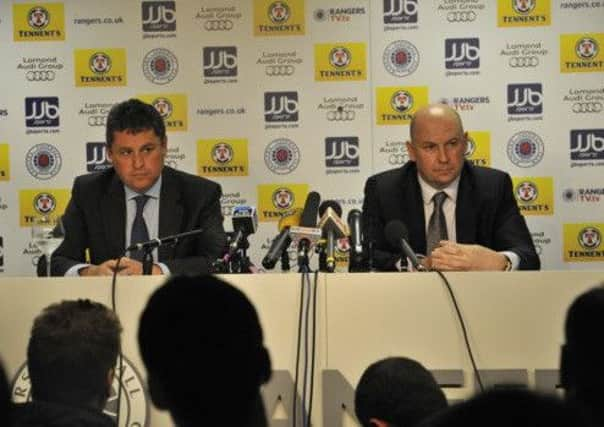Prosecution authorities claim immunity over ex Rangers administrators' damages claim


David Whitehouse and Paul Clark faced criminal proceedings in the wake of the takeover of the Ibrox club by Craig Whyte from Sir David Murray and its subsequent sale before a High Court judge dismissed remaining charges against them.
Both men have since brought actions suing the current Lord Advocate James Wolffe QC, Scotland’s senior law officer, and former Police Scotland Chief Constable Philip Gormley.
Advertisement
Hide AdAdvertisement
Hide AdMr Whitehouse, of Cheshire, raised an action for £9 million damages and Mr Clark, of Surrey, is seeking in excess of £5 million.
A debate in the case at the Court of Session in Edinburgh began today before judge Lord Malcolm in which the Crown is seeking to establish it has immunity against such proceedings.
The court heard that the former administrators maintained that the then Lord Advocate initiated and pursued “a wrongful prosecution” and that there was no evidential basis for the charges brought against them.
Gerry Moynihan QC, for the Lord Advocate, told Lord Malcolm that he would be asking him to concentrate on the legal principle of immunity.
He said: “Although there are two separate actions and two separate judgements required by your lordship and there are differences of detail, the issues are essentially the same.”
Mr Moynihan argued that there was authority from the Inner House of the Court of Session, where civil appeal judges sit, conferring immunity on the Lord Advocate and that Lord Malcolm was bound by that decision.
He said that if he was correct in his primary submission that the Lord Advocate had immunity at common law then there was no need to debate the relevancy of the pleadings put forward.
Advertisement
Hide AdAdvertisement
Hide AdMr Moynihan said he accepted that the previous legal authority did not apply to claims brought under the Human Rights Act.
He said that claims under article 5, covering the right to liberty and security, over the detention of Mr Whitehouse and Mr Clark would require to proceed to an evidential hearing.
Following Mr Whyte acquiring Rangers in 2011 the club went into administration in February the following year with Mr Clark and Mr Whitehouse appointed as the administrators.
Six days later Mr Whitehouse made contact with the police to raise concerns about preceding conduct, particularly that of Mr Whyte, said Mr Moynihan.
Later that year the Crown Office announced that it had instructed the then Strathclyde police force to start an investigation into the acquisition of Rangers. It is maintained that the Crown was “the directing influence” in the investigation.
The club later went into liquidation before being sold to a consortium led by Charles Green. In 2014 Mr Whitehouse and Mr Clark, of Duff & Phelps, were detained by the police for the first time and appeared on petition in the sheriff court.
They were detained again the following year and held overnight and then appeared in court on a second petition.
Advertisement
Hide AdAdvertisement
Hide AdBy the time the case reached the High Court in 2016 a debate on the pleadings in the criminal case was held. The Crown dropped several charges the men faced and Lord Bannatyne dismissed the remaining two against them as the prosecution floundered. Ultimately only Mr Whyte stood trial and he was acquitted by a jury at the High Court in Glasgow.
Mr Whitehouse and Mr Clark maintain that there detention was wrongful and damage was inflicted on professional reputations. It is also alleged that human rights were infringed and loss, injury and damage followed.
But Mr Moynihan said in relation to the previous legal authority “on any view there is immunity for both the Lord Advcocate and any procurator fiscal depute in relation to solemn proceedings on indictment”.
He said that a fiscal or an advocate depute, who prosecutes in the High Court, were “merely the hand by which the Lord Advocate discharges his function”.
“He and all those who act at his direction enjoy the immunity,” he told the court.
Heriot Currie QC, for Mr Whitehouse, told the court that a motion seeking summary decree, involving an award of damages without evidence being led, against the chief constable should be continued to a future date to be fixed.
The hearing continues.